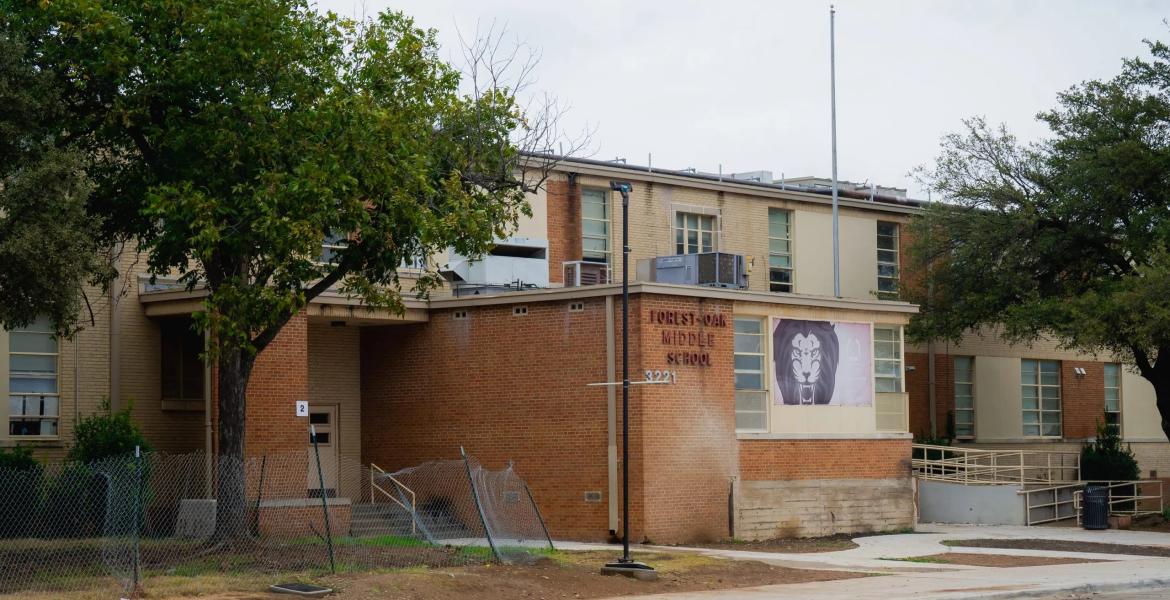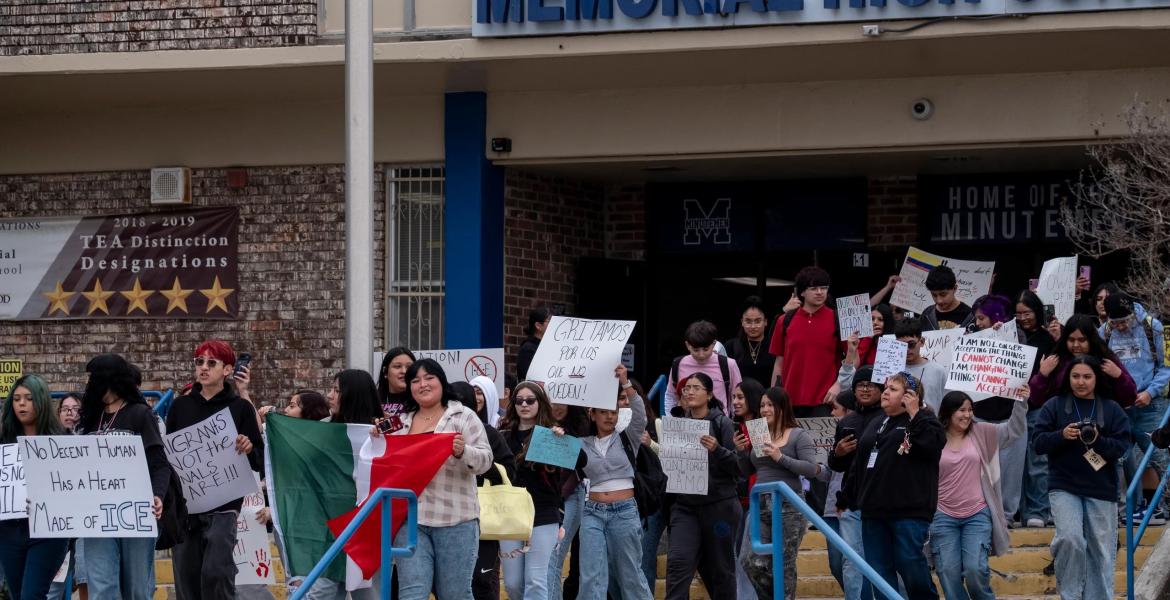After the birth of Nicole and Jeff Dilts' daughter, Charlotte, the couple’s son, JP, who was 3 years old at the time, didn’t handle the news very well. He starting throwing fits at daycare and running away from teachers; or, he would kick and bite some of his fellow classmates during free-play time because he was “overwhelmed.”
The daycare teacher, clearly frustrated, told the Dilts, “I think there’s something really wrong with him.”
Those words didn’t sit well with the couple, and they were concerned because JP didn’t have the same issues at home.
“We were at a loss and asked how we could help, but JP didn’t act that way at home,” Nicole said. Immediately after the discussion with the teacher, the concerned mother began her search for a new daycare, but things went from bad to worse.
[[{"fid":"14368","view_mode":"preview","type":"media","attributes":{"alt":"JP, 5, who has autism, loves to draw in the comfort of his living room.(San Angelo LIVE!\\Brandy Ramirez)","title":"JP, 5, who has autism, loves to draw in the comfort of his living room.(San Angelo LIVE!\\Brandy Ramirez)","height":"1936","width":"2592","class":"media-element file-preview imgbody"}}]]
Above: JP, 5, who has autism, loves to draw in the comfort of his living room.(LIVE! Photo/Brandy Ramirez)
“He went through three daycares very quickly,” Nicole said. At the second daycare, JP's behavior didn't improve, and it didn't take long for the staff to demonstrate their frustration; and by the third daycare, JP lasted all of three hours.
“They sent him home, and that was just so frustrating,” Nicole recalled. She said one of the daycare employees told her, “I think your kid is retarded or something.”
The Stigma of Autism
Retarded, unfortunately, is a common term used to describe children with autism, and the stigma of the disorder often gets associated with Dustin Hoffman's character in the movie Rain Man; however, for parents like the Dilts, that nowhere describes what autism is, nor does it describe their now 5-year-old son who loves to play math pattern games on his nabi tablet, talk to SIRI on an iPhone, build the rails and walls that go with his Thomas the Tank Engine automated train set with his father and watch it go up the track, through the mountain and over the table. Nor does it describe the little boy who is now counting the days until the first day of Kindergarten.
“He’s really looking forward to learning,” Nicole said. “Most kids I know with autism love school because of the structure.”
Granted, JP does struggle with the number patterns a bit because his hands shake, but that could be associated with the mild case of cerebral palsy, which doctors diagnosed JP with during the spring.
“Sometimes, there are additional issues behind autism,” Nicole said about the added issue.
As for the diagnosis of autism, Nicole said it’s a sensory disorder, and children like JP don’t perceive senses the same way. A more formal definition of autism described by the Autism Science Foundation includes a reference to Autism Spectrum Disorders (ASD), developmental disabilities that cause substantial issues with social interaction and communication, as well as the presence of unusual behaviors and interests. In other words, children with autism communicate differently than the norm.
Today, 1 out of 68 children are diagnosed with autism, and in boys like JP, 1 out of 40 are diagnosed. ASF states that children with ASDs “have ‘unusual ways’ of learning, paying attention and reacting to different sensations.” Additionally, thinking and learning abilities will vary from gifted to severely challenged, and children usually show signs of autism before the age of three. Contrary to what some people argue, ASDs last throughout life.
Nicole comes from a family where five children, now including JP, have autism. Although she knew there was a possibility that gene could carry down through her children, her first two, Laura, now 14, and Leah, 9, didn’t have any issues.
It wasn’t until JP, who at 12 months, displayed some of the signs. Nicole said JP wasn’t talking much, nor was he walking; however, people could tell the toddler was smart, and she would hear that boys sometimes develop slower than girls. Thus, it wasn’t until the behavioral issues began that Nicole realized there could be something more.
“After the incident at the last daycare, we took JP to a psychologist for behavioral issues, and everyone was just at a loss,” Nicole said.
The Diagnosis of Autism
Because psychologists were at a loss, Nicole’s mother encouraged the couple to take JP to the San Angelo Independent School District and get him tested. It was at that point they learned JP had autism, and he was provided with an educational diagnosis. Although they still had to get a medical diagnosis, which is something different, they at least knew JP would be provided with the services and help he needed. Soon after, he started the Preschool Program for Children with Disabilities, or PPCD, at Reagan Elementary in San Angelo.
“They’re just angels,” Nicole said about the people with the program. “I don’t know what I would have done if I wouldn’t have gotten that educational diagnosis. It was to the point that we were afraid that [JP] would hurt Charlotte because he was frustrated and throwing things.”
For Jeff Dilts, it was no surprise JP felt the way he did. He said, “What is still frustrating is that we had to go through different daycares, and these people are supposed to know and be able to recognize that maybe a child has a specific issue.”
For Nicole, she felt the “workers at the daycare seemed to genuinely dislike him,” and as a parent, that hurts, she said.
“It’s hard to deal with it,” Nicole added. “The fact that so many people in the field of taking care of kids just don’t know.”
Not only don’t they know, but many people don’t believe autism is really an issue, nor do they believe Attention Deficit Disorder (ADD) and Attention Deficit Hypertension Disorder (ADHD) exist as well.
"Instead, they have websites that say, ‘Your child isn’t autistic, he’s just an asshole,' which is actually a website page,” Jeff said. “It’s really there, and you’d be surprised how many more like that there are.”
With commentary like that and the challenges they faced, the Dilts said they went through some tough times after JP got the initial diagnosis.
“When we first got him diagnosed, we felt like we couldn’t take him anywhere. It was very frustrating,” Nicole said. “Something like the mall play land, he would have a screaming fit and try to escape. We couldn’t go out to eat. We were also embarrassed when anybody, including family, came over. It was just unmanageable, and we didn’t know what to do.”
For Jeff, he said not only was it something he had to adjust to, but he also had this idea that because of JP getting diagnosed with "this and that", it was almost as if “he was some kind of monster.” Thus, he would ask why this had to happen.
“It just took me a second though to realize that [this diagnosis] doesn’t change him at all. He’s still the same kid. It’s like I woke up and said ‘Hey he was this normal kid yesterday, and today, he’s got this diagnosis.’ So it was more about just learning to adapt to him and saying, ‘What can I do to change him?’ Now, it’s no longer how I can change him, but rather how I can help him,” Jeff said.
The Acceptance and Challenges of Autism
Now, with all the resources provided, Nicole and Jeff feel they know how to combat the issues. They know why their son freaks out at certain places, or why he does certain things.
“It’s an individual decision parents have to make,” Nicole said about diagnosis, treatment and acceptance.
Of course, it took time and help for the Dilts to make that decision, but with that educational diagnosis, the couple chose to take the next steps and took their son to a pediatrician in San Angelo. Unfortunately, most regular pediatricians aren’t equipped to diagnose autism, so the couple had to get a referral to a specialist in Lubbock, which is not unusual.
“Most people in San Angelo have to go to San Antonio, Dallas or Lubbock to visit with a specialist,” Nicole said.
Once JP saw his specialist, the doctor requested JP to see a geneticist because, as stated previously, there tends to be underlying conditions associated with autism. In addition to seeing a geneticist, JP now also sees a developmental pediatrician who specializes in autism in San Antonio, Dr. Patricia Harkins. The doctor has helped JP by prescribing and adjusting medications for the boy’s ADHD and anxiety.
“A lot of kids with autism have severe anxiety,” Nicole said. “They have to fight their nervous systems all the time.”
Additionally, Dr. Harkins has helped the Dilts get therapy for JP, which can be a challenge in San Angelo because the school district doesn’t always have the resources. Originally, the doctor wrote a referral for occupational and speech therapy, but JP only got the first. At this time, he still can’t dress or undress himself, nor can he put his shoes on.
The couple had also hoped to take JP to the West Texas Rehab Center, but for some time, it didn’t take university insurance. Nicole, also known as Dr. Nicole Dilts, is an associate professor at Angelo State University. To get therapy, Nicole and Jeff would have had to pay approximately $200 her hour for services.
Of course, these issues were a challenge for the Dilts, but thanks to the Autism Community in San Angelo, the parents found the resources they needed to help their child. JP also attends West Texas Rehab Center, which now accepts the Dilts' insurance plan. Providers there recently told the Dilts that JP may qualify for their brand new food program, which helps children with autism and other disabilities to learn how to try new foods, use utensils and sit still at the table.
[[{"fid":"14369","view_mode":"preview","type":"media","attributes":{"alt":"Children with autism, including JP, love to build things, and they love structure.(San Angelo LIVE!\\Brandy Ramirez)","title":"Children with autism, including JP, love to build things, and they love structure.(San Angelo LIVE!\\Brandy Ramirez)","height":"1936","width":"2592","class":"media-element file-preview imgbody"}}]]
Above: Children with autism, including JP, love to build things, and they love structure.(LIVE! Photo/Brandy Ramirez)
The Theories Behind Autism
For JP, food is a big thing. Nicole said when he was first diagnosed, she and Jeff noticed their son wouldn’t eat breakfast items, including pastries, which is unusual for a child. He would say, “Ewww that tastes funny.”
She said, “We found that he was tasting the chemicals in food, so from there we started buying more organic. Now, he will eat more foods.”
Some autism experts believe, including Nicole’s family, that the chemicals in America's food supply are the cause of autism and the spike in numbers.
In fact, Nicole mentioned a MIT research project conducted by Stephanie Seneff, PhD. An article in Health Impact News states this scientist has researched biology and technology, and has published over 170 scholarly peer-reviewed articles. In recent years, Seneff has found a relationship between nutrition and health, and addresses autism among other issues. Seneff said that at today’s rate, by 2025, one in two children will be autistic because the side effects of autism “closely mimic those glyphosate toxicity,” and has presented data showing a consistent correlation between the use of Roundup (a herbicide brand manufactured by Monsanto) on crops and the creation of Roundup-ready GMO crop seed, with rising rates of autism. To learn more, click here.
Of course, this is a controversial debate still taking place, but Nicole feels that because JP can taste the chemicals in regular food, there is something to this study. Furthermore, many children and people with autism choose to do the same because of taste sensory overload.
In addition to diet, Nicole takes JP to ABA Therapy at the Autism Behavior Communication Center for Children (ABC) at MHMR Services for the Concho Valley. ABA is Applied Behavior Analysis and is a “scientific discipline that allows experts to derive the function of behavior through systematic analysis of environmental contingencies,” according to the agency’s website. This helps professionals to develop a treatment package for a child based on how he or she relates to his or her specific environment.
This process is also controversial, but Nicole said since JP has engaged in these services, her family has seen a big change, and they too have grown with the process. It also helps that many parents in San Angelo who are experiencing the same challenges have been a big help and now provide a great support system. Because of that support system, JP can now enjoy regular playdates with kids his age and who share the same issues as he does.
“He doesn’t feel different because he knows he’s different,” Nicole said.
A Life with Autism
Even though he may be different, JP enjoys all the things normal boys do. He loves to play with his 2-year-old sister, Charlotte, and he follows his two older sisters around. He defends himself when other kids pick on him, and he defends his loved ones when he feels someone wants to hurt them.
Recently, his little sister started daycare, and when JP walked in and saw where she would be going, he got upset.
“He had a total panic attack. He said she can’t go to this awful school and was screaming. He grabbed her hand, ran out the door and said, ‘No! She needs a real school!’ He did this because he had a good experience at PPCD and a terrible experience at daycare,” Nicole said.
Luckily, a previous student who babysat for the Dilts now works at this daycare, so JP felt better about his sister attending it.
The Dilts said JP, overall, is not the type of child with autism who stays to himself or recoils from connection. These children are referred to as “avoiders.”
“JP is a seeker. He loves people. He loves hugs. He gets very physical and in people’s faces, and sometimes they recoil, or they don’t understand why he’s being that way and climbing on things,” Nicole said.
Although this can be a challenge for the boy, JP has learned to accept his differences, and many people, especially adults, have to be educated to his condition, Nicole said. Sometimes though, the professor said people don’t always get it because they don’t know about autism or how to handle children with it.
“We understand that’s a lot to deal with, so we try to be objective and know what they’re seeing is not the same as us,” she noted.
Being objective and patient isn’t always easy, especially because some people can say hurtful things, Nicole said. There are also those people who won’t change their perceptions, and don’t understand that many kids with autism are highly intelligent; they simply have a hard time communicating.
Nicole said when she tries to explain autism to people, she thinks of Dr. Temple Grandin, a woman with autism who has become one of the top scientists in the humane livestock handling industry, and whose story was retold through a Hollywood movie. Dr. Grandin describes autism as being in a building with elevators that don’t necessarily go to the right floor. In other words, a person can press #4, but may end up on the third floor instead.
Luckily for the Dilts though, the people who matter the most, which includes their family and their bosses at work, have been understanding and helpful through the challenges the family has faced. Dilts has been able to teach many of her classes online, so she has been able to be there for JP. Jeff’s boss at the Outback Steakhouse, has also been very understanding about the situation.
“Normally, one parent usually ends up having to quit work,” Jeff said, which is why the couple feels grateful for the support of their employers.
Education about Autism
Because of their journey with JP, the Dilts family now try to help educate others about children with autism. JP’s big sister, Laura, who is an artist and has a best friend with autism, uses her creativity as an education tool. Moreover, Nicole teaches a cultural technical writing course and implements the topic into the discussion, which has helped students with autism in her class.
“I had a student in my culture class who said she can’t live in the dorm because of the noise. She said she would have loved to stay with her friends there, but she has to live at home so she can be in her environment and do what she has to,” Nicole said.
For Nicole, that was an important step for the student because she opened up about her experience, which is not easy for some students to do because of the stigmas associated with autism. This is why the professor feels education about the disorder important.
“Our crisis as a society is that we’re seeing all these kids with autism,” Nicole said. “What will happen when they all become adults?”
This is a real fear for many parents who have children with the disorder, and one of many reasons why families like the Dilts continue to push for acceptance.
Subscribe to the LIVE! Daily
Required






Comments
Listed By: Rick McGee
Thank you for the great article on autism and the people it effects. Yes I do have a son with autism and can empathize with this family and the joys and heartaches that come with the diagnosis.
Rick
- Log in or register to post comments
PermalinkPost a comment to this article here: